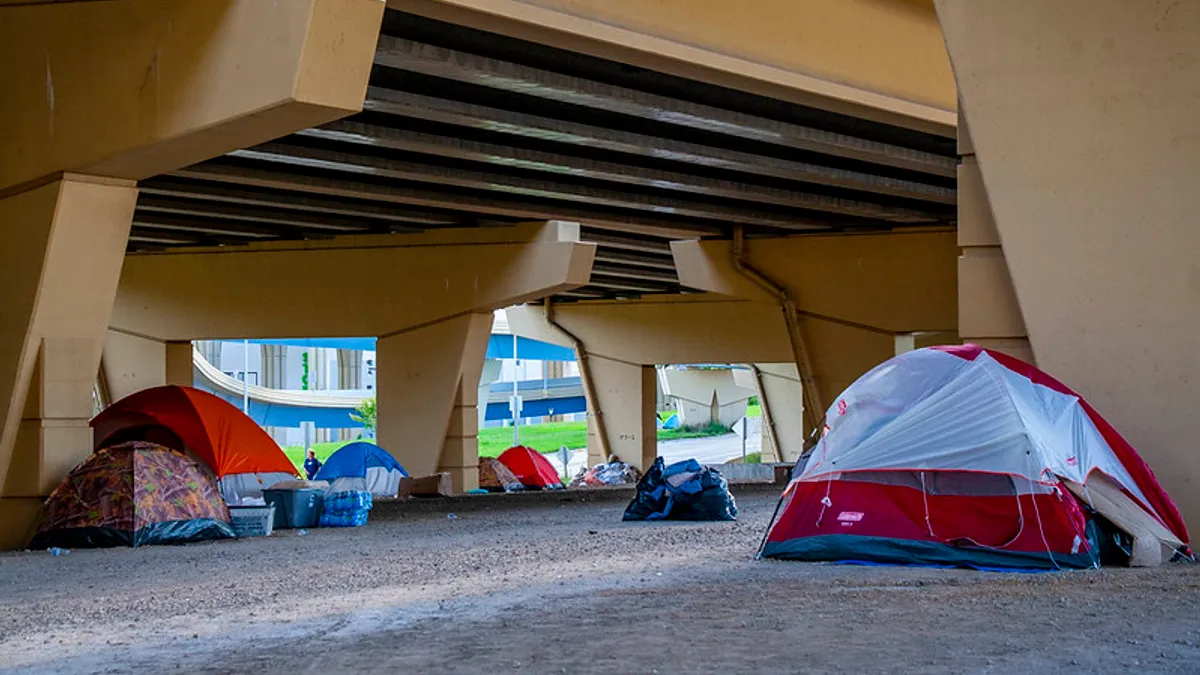Dive Brief:
- A majority of mayors in a survey of over 100 cities believe they are being held accountable by residents to address homelessness, but only about one out of five of those surveyed feels they have substantial control over the issue, according to a report released Tuesday from the 2021 Menino Survey of Mayors.
- The Menino Survey of Mayors, led by the Boston University Initiative on Cities, included conversations with 126 mayors between June and August 2021. Mayors reported having limited staff to address homelessness, with nearly one-third saying they have no staff exclusively dedicated to serving homeless populations. Furthermore, mayors have limited data on homelessness: 38% reported only having access to annual citywide data.
- "If a mayor feels like they don’t have the authority, the data or the choice points they need to really build a system that can end homelessness, they should put those issues on the table and reorganize the local system,” Jake Maguire, principal at the nonprofit Community Solutions and co-director of its Built for Zero team, said in an email interview. Community Solutions, along with Citi and The Rockefeller Foundation, sponsored the report.
Dive Insight:
The rate of homelessness increased for the fourth year in a row in 2020, according to results of the annual point-in-time count released last year by the U.S. Department of Housing and Urban Developing. The report found that 580,000 people lived on streets or in temporary shelters at the beginning of 2020 before the pandemic.
The effects of homelessness can be devastating: The mortality rate among individuals experiencing short-term homelessness in temporary housing or shelters is three times that of the general population. "Yet despite this stark reality, we have very little systematic knowledge about the policy landscape shaping how we address this crisis in the United States," according to the Menino Survey report.
As mayors look to reckon with their systems for addressing homelessness, they can ask themselves the following questions, Maguire said: "What would it take to get real-time data on this problem? What would it take to build one, integrated team with the authority to move the pieces around?"
"First and foremost, a mayor is a manager," he said. "But a mayor can’t manage much without meaningful data on the problem and a nimble, well-structured team to respond."
Funding is flagged in the survey by more than 60% of mayors as another significant barrier to addressing homelessness. Majorities of mayors also cite other key obstacles, including public opposition to new housing and shelters and a lack of coordination between various government and social service agencies.
Mayors also view local nonprofits, continuums of care, and the police as key actors in shaping policy around homelessness. Meanwhile, mayors don’t seem to agree on the definition of "policy success" in regard to curbing homelessness. Only 40% of mayors "explicitly outline" a policy goal to reduce homelessness, while 11% call for minimizing the negative impacts of homelessness for businesses and residents and 16% define success as access to better social services.
"Without a clear definition of success, local strategies become really vulnerable to short-term political pressures, like an encampment in a high-profile area, rather than the long-term system improvements that we know reduce homelessness over time," Maguire said. "It’s very hard to ‘short-term’ or ‘quick win’ your way out of this problem."












